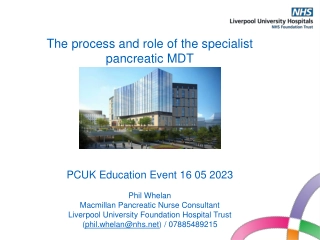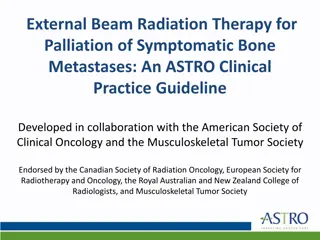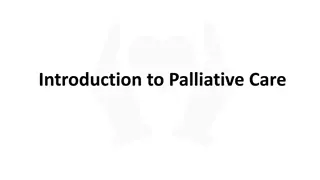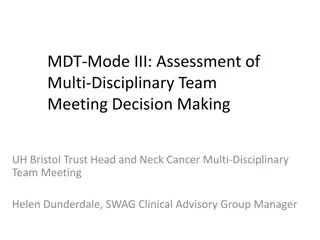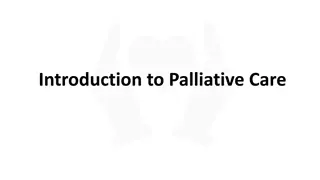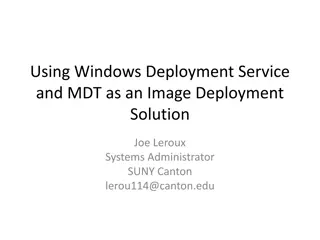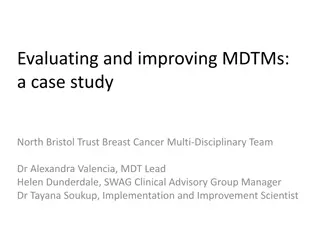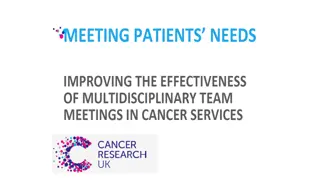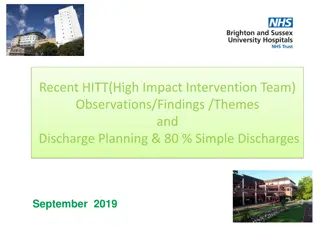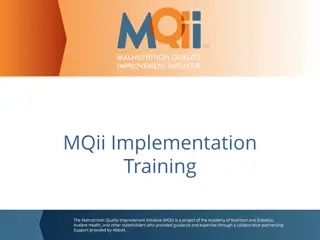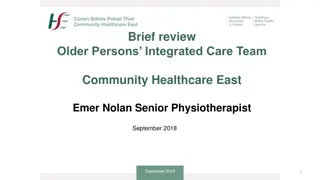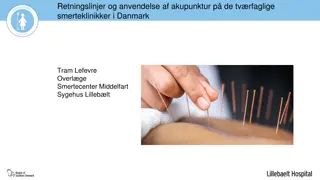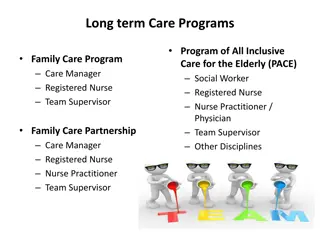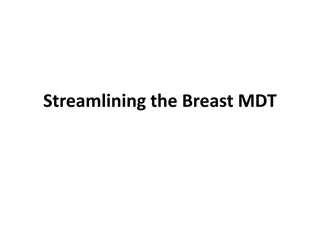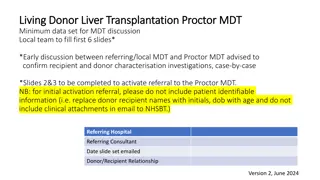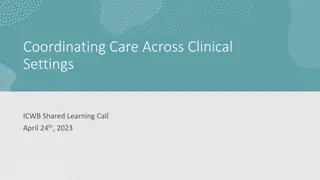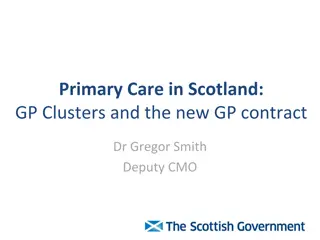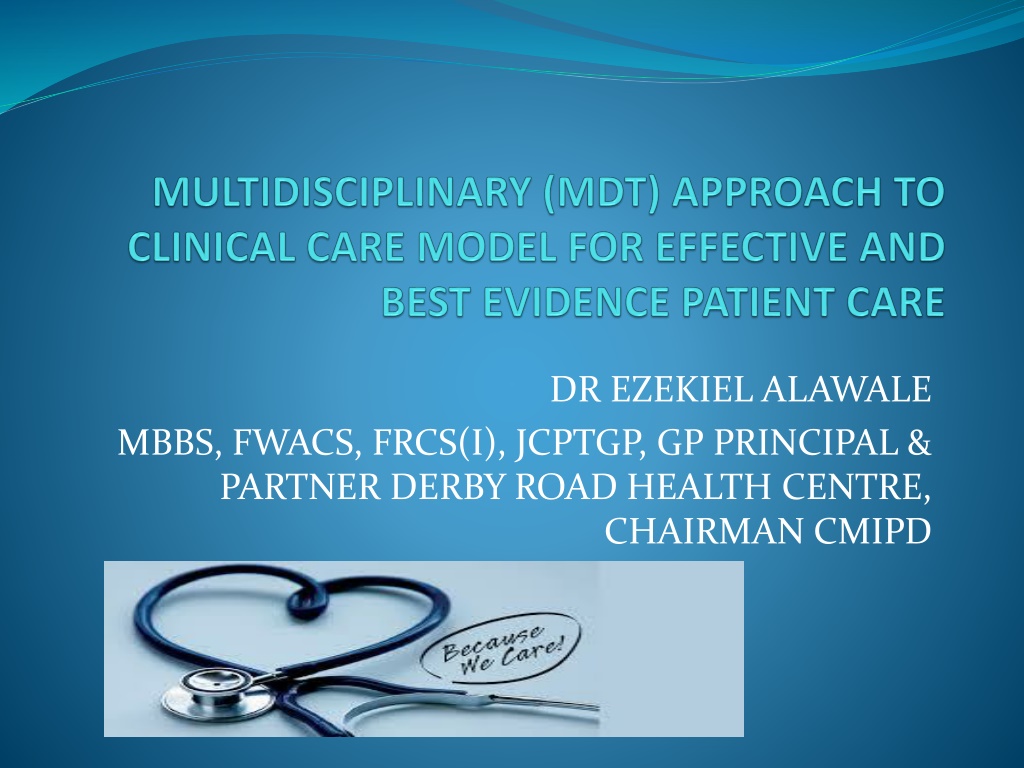
Understanding Multidisciplinary Care in Healthcare
Explore the concept of multidisciplinary care in healthcare, where professionals from various disciplines collaborate to provide integrated patient management. Learn about the principles, benefits, and importance of multidisciplinary teams in delivering effective and evidence-based care to patients.
Download Presentation

Please find below an Image/Link to download the presentation.
The content on the website is provided AS IS for your information and personal use only. It may not be sold, licensed, or shared on other websites without obtaining consent from the author. If you encounter any issues during the download, it is possible that the publisher has removed the file from their server.
You are allowed to download the files provided on this website for personal or commercial use, subject to the condition that they are used lawfully. All files are the property of their respective owners.
The content on the website is provided AS IS for your information and personal use only. It may not be sold, licensed, or shared on other websites without obtaining consent from the author.
E N D
Presentation Transcript
DR EZEKIEL ALAWALE MBBS, FWACS, FRCS(I), JCPTGP, GP PRINCIPAL & PARTNER DERBY ROAD HEALTH CENTRE, CHAIRMAN CMIPD
INTRODUCTION Multidisciplinary care is a collaborative patient management It involves drawing appropriately from multiple disciplines to redefine problems outside of normal boundaries and reach solutions based on a new understanding of complex situations.
WHAT IS MDC? Multidisciplinary care is an integrated team approach to healthcare. It involves evaluation of treatment options and planning as a collaborative processes MDC involves a range of professionals which commonly includes, medical, nursing and allied healthcare professionals in concertation with the patient and the patient s family. The individual patient-specific treatment plans are developed making delivery of care a shared responsibility Regarded as best practice
PRINCIPLES OF MDC A team approach, involving specialists, GP, AHP, social worker, supportive care worker etc Regular communication among team members is essential Access to a full range of therapeutic options Provision of care in line with the national standards and treatment decisions based on adequate information Patients are involved in their care discussions and management, and should receive timely and appropriate information from the healthcare professionals
WHAT IS A MULTIDISCIPLINARY TEAM? A multidisciplinary team is a group of health care workers who are members of different disciplines, which meets together at a given time (whether physically in one place, or by video or teleconferencing) to discuss a given patient and who are each able to contribute independently to the diagnostic and treatment decisions about the patient MDT model in patient care was introduced and endorsed to ensure that care delivery is consistent with the best available evidence
EVIDENCE Provides consistent, continuous, coordinated and cost effective care to patients (Fleissig et al 2006). Decisions are likely to conform to evidenced based guidelines than those made by individual clinicians (Vinod et al 2010). Shorter mean time from diagnosis to treatment (Gabel et al). Effective in advanced disease Increased patient satisfaction (Gabel et al 1997). Higher proportion of patients receiving NACT.
Cath Taylor et al BMJ 2010 EVIDENCE IN RELATION TO CANCER Multidisciplinary team working in cancer: what is the evidence? Improved Clinical Decision making More Coordinated Patient Care Improvement to overall quality of care More evidence based treatment decisions and Improved Treatment England and international evidence for their effectiveness
Saini et al 2012, 97%- improved clinical decision making 93%- improved overall quality of treatment 91%- more coordinated patient care 91%- evidenced based treatment decision and 9%- improved survival rates Large International surgery from 39 countries
BENEFITS OF MDC Multidisciplinary approach to care results in: Greater patient satisfaction Improved financial performance Reduction in mean duration of hospitalisation A significant reduction in number of unplanned hospital readmissions
Benefits 1. International Journal of Breast Cancer Volume 2011:Cancer Multidisciplinary Team Meetings: Evidence, Challenges, and the Role of Clinical Decision Support Technology
MDT MEETING (MDTM) Efficient MDTMs that start promptly and discuss: The right patient At the right time With the right clinicians present With all the relevant information readily available And with processes in place to collect the required data. Good team dynamics
BARRIERS TO ADOPTION OF MDC Resistance to change by the clinicians A lack of funding to support the MDC model A lack of time on the part of clinicians to attend MDT meetings Differences between the public and private healthcare sectors Workforce issues and pressures on disciplines, e.g. pathologists who may need to attend several meetings each week The unknown cost of MDC Difficulty of establishing MDC in rural and remote areas because of a lack of team members
Summary MDT are extremely important in providing the best care for our patients Essential for the right people to be present at the right time with the right resources available Breast cancer patients managed in an MDT have better care and experiences
CONCLUSION Multidisciplinary approach to patient care will lead to: Improved clinical decision making Improved clinical outcomes Improved patient experience and Improved working lives of team members


